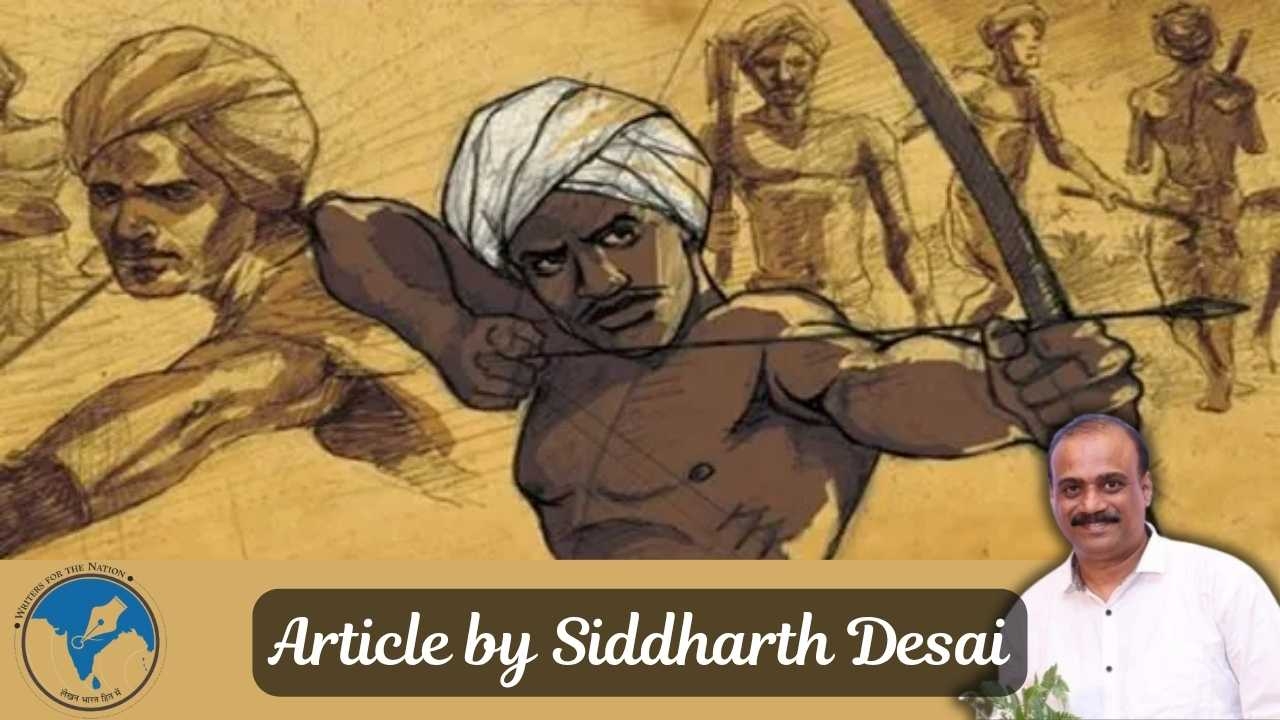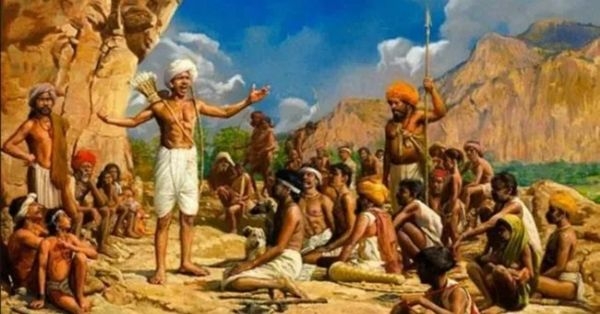Birsa Munda: The Revolutionary Spirit of the Tribal Struggle
A legendary tribal freedom fighter, Birsa Munda led a heroic uprising against British rule, defending land, culture, and identity with unyielding courage.
Total Views |

Several remarkable leaders emerged during the Indian freedom struggle, directly challenging the British and setting new ideals for freedom fighters. Among them was Birsa Munda, who organised tribal communities and ignited the spirit of freedom by the age of 24.
Many influential figures embraced Indian culture, leading lives that instilled a sense of nationalism. Leaders who prioritise the welfare of humanity over their interests are truly revered. Birsa Munda was one such revolutionary, sacrificing his life for his country and community while fighting for the rights of the tribal population. He led a mass movement against British rule, uniting and awakening tribal society, ultimately pressuring the British to leave Indian soil.
In Parliament, statues of great personalities, revolutionaries, spiritual leaders, and cultural icons represent those who awakened a new consciousness. Among them, Birsa Munda’s statue stands out prominently. The installation of Birsa Munda's statue in Parliament is a significant honour for the tribal community, serving as an enduring source of inspiration and symbolising the struggles of marginalised individuals fighting for their rights. Members of Parliament have a responsibility to protect and promote the interests of tribal people; even if they do not raise arms, they should raise their voices in Parliament.
Before the British arrived in Jharkhand, the region was governed by tribal leaders. However, British rule threatened the freedom and autonomy of the tribal population. For centuries, forest dwellers relied on water, forests, and land for their livelihood. The tribal community has always been sensitive to issues of freedom and rights, which is why they continue to fight for their autonomy at great personal cost.
When the British attempted to seize resources from the tribals, the movement known as Ulgulaan, declared by Birsa Munda, emerged. He rallied his people with the powerful slogan, "Abua Raj Ete Jana, Maharani Raj Tundu Jana" (Let our kingdom be established, let the queen's kingdom be ended)—a call that resonated with later heroes of the freedom struggle.
Tribal communities, including the Munda, Santhal, Khasi, Ahom, and Bhil, resisted British encroachment. Birsa Munda emerged as a formidable leader, rallying the Munda people against the British and achieving significant victories.
Born on November 15, 1875, Birsa Munda gained profound insights into the social and economic exploitation of tribals by the age of 24. Despite his short life, he became one of the most feared figures by the British, uniting the tribal population against colonial rule and teaching them to raise their voices.

Birsa aimed to preserve his culture and religion, revitalising the Munda tradition and social structure. His struggle was not merely political; it was a fight for the protection of local identity. Thus, Birsa Munda is celebrated not only as a hero of Jharkhand but also revered nationally. In tribal society, he is worshipped as ‘Bhagwan Birsa Munda.’
His contributions to raising consciousness among the Munda community and opposing British exploitation were monumental. The tribals fought bravely with bows and arrows, inspired to unite and resist. To them, divinity is embodied in those who act selflessly for the welfare of others, making such individuals revered figures in India.
Birsa Munda's movement coincided with significant changes in Jharkhand, particularly in the context of establishing a fundamental state. Religious transformations were occurring, influenced by the Charter Act of 1813, which permitted missionary activities in India. This led to the implementation of the ‘begari’ (forced labour) system, compelling tribals to work on projects like railway construction.
Colonial rule exploited the ‘begari’ system to force tribes to work without compensation while dismantling their social and cultural structures. The introduction of the Forest Act of 1882 abolished traditional land ownership rights, further entrenching colonial dominance.
Unlike earlier revolts primarily aimed at protecting land, Birsa Munda's Ulgulaan sought to achieve three critical goals:
1. To safeguard resources like water, forests, and land.
2. To ensure the safety and protection of women.
3. To preserve the culture and dignity of tribal society.
On August 24, 1895, Birsa was arrested and sentenced to two years in Hazaribagh Central Jail. Upon his release, he realised that rebellion was the only viable option left, as British laws increasingly threatened the tribals.
Between 1897 and 1900, conflicts arose between forest dwellers and British soldiers. On January 7, 1900, Birsa's companions attacked the Khunti police station. Indigenous tribes utilised bows and arrows as their primary weapons, culminating in a significant struggle at Dumari Hill on January 9, where many innocents lost their lives.
After his release from prison, the British recognised Birsa Munda as their most significant threat, leading to futile attempts to contain him. Ulgulaan represented a transformative movement under Birsa Munda’s leadership, showcasing the exploitative nature of colonial rule.
Despite being armed with traditional weapons, the tribes effectively resisted British oppression, compelling the enactment of the Chotanagpur Tenancy Act of 1908, which recognised tribal land rights and established Chotanagpur as a self-governing area.
The British government devised a strategy to exploit tribal divisions, ultimately leading to Birsa Munda's betrayal by forest dwellers motivated by greed. On February 4, 1900, he was captured and falsely imprisoned, where he suffered from slow poisoning, leading to his death on June 9, 1900. The British attempted to portray his death as natural, fearing that news of his murder would incite tribal anger.
During the 18th and 19th centuries, many heroes, including Mahatma Gandhi, Subhas Chandra Bose, and Bhagat Singh, fought against British oppression. Mahatma Gandhi’s "Quit India," Subhas Chandra Bose’s "Jai Hind," and Bhagat Singh’s "Inquilab Zindabad" were significant slogans of resistance. It can be argued that Birsa Munda's Ulgulaan laid the foundation for these movements.
The Munda rebellion posed a considerable threat to the British, leading to Birsa Munda’s imprisonment and slow poisoning. Many heroes become symbols of struggle, and it is fitting that Birsa Munda is represented as such. In Jharkhand, statues and images of Birsa in chains serve as inspiration and reminders of history.
I urge the youth of our country, both men and women, to draw inspiration from our revolutionary figures—those who sacrificed their lives for the freedom of the nation and the welfare of their people. Let their ideals inspire your personal development.
When Mahasweta Devi wrote a novel about Birsa Munda, songs honouring this great hero echoed in the tribal community, and the sound of Ulgulaan still resonates in tribal literature. Known as "Dharti Aaba," Birsa Munda fought for water, forests, land, freedom, and identity, leaving an indelible mark on the lives of the people. His movement inspired future revolutionaries, instilling in them the courage to confront British oppression directly.
Article by
_202507291641358836_H@@IGHT_326_W@@IDTH_380.jpeg)
Siddharth Desai
Columnist - Writers For The Nation
Mumbai, Maharashtra

